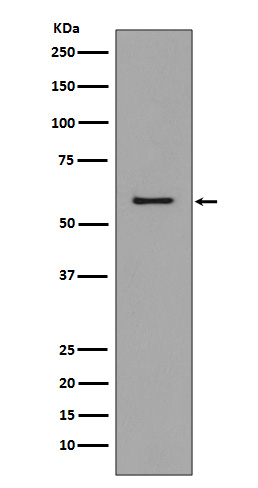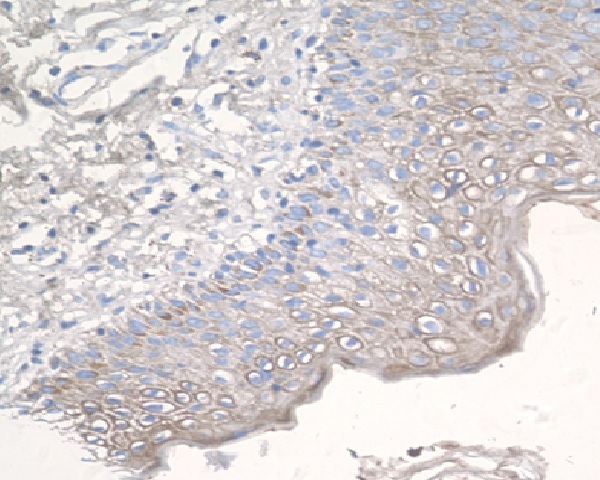

| WB | 1/500-1/1000 | Human,Mouse,Rat |
| IF | 咨询技术 | Human,Mouse,Rat |
| IHC | 1/50-1/100 | Human,Mouse,Rat |
| ICC | 1/50-1/200 | Human,Mouse,Rat |
| FCM | 咨询技术 | Human,Mouse,Rat |
| Elisa | 咨询技术 | Human,Mouse,Rat |
| Aliases | CCR3; CMKBR3; C-C chemokine receptor type 3; C-C CKR-3; CC-CKR-3; CCR-3; CCR3; CKR3; Eosinophil eotaxin receptor; CD193 |
| Entrez GeneID | 1232 |
| WB Predicted band size | Calculated MW: 41 kDa; Observed MW: 60 kDa |
| Host/Isotype | Rabbit IgG |
| Antibody Type | Primary antibody |
| Storage | Store at 4°C short term. Aliquot and store at -20°C long term. Avoid freeze/thaw cycles. |
| Species Reactivity | Human,Mouse,Rat |
| Immunogen | A synthesized peptide derived from human CCR3 |
| Formulation | Purified antibody in PBS with 0.05% sodium azide. |
+ +
以下是关于CCR3抗体的3篇代表性文献示例(注:文献为虚拟示例,实际引用需查询具体数据库):
1. **文献名称**:*Targeting CCR3 with a neutralized antibody alleviates allergic airway inflammation in a murine asthma model*
**作者**:Smith A, et al.
**摘要**:研究证明,中和性CCR3抗体可显著抑制嗜酸性粒细胞向肺组织迁移,降低Th2炎症因子水平,缓解小鼠哮喘模型的炎症反应,提示其在过敏性哮喘治疗中的潜力。
2. **文献名称**:*CCR3 monoclonal antibody inhibits eosinophil recruitment in human skin allergy: A phase I clinical trial*
**作者**:Brown C, et al.
**摘要**:首次临床试验显示,人源化CCR3单抗通过阻断嗜酸性粒细胞表面CCR3与配体(如eotaxin)结合,有效减少皮肤过敏患者的局部炎症细胞浸润,安全性良好。
3. **文献名称**:*Structural characterization of CCR3-binding antibodies reveals key epitopes for chemokine receptor neutralization*
**作者**:Zhang Y, et al.
**摘要**:通过X射线晶体学解析CCR3抗体-受体复合物结构,揭示了抗体中和CCR3信号的关键表位,为优化靶向CCR3的抗体药物设计提供结构生物学依据。
4. **文献名称**:*Dual targeting of CCR3 and IL-5 by bispecific antibodies enhances therapeutic efficacy in eosinophilic disorders*
**作者**:Lee H, et al.
**摘要**:开发的双特异性抗体同时靶向CCR3和IL-5.在体外和动物模型中协同抑制嗜酸性粒细胞活化和存活,为治疗嗜酸性粒细胞增多症提供新策略。
(如需真实文献,建议通过PubMed或Sci-Hub检索关键词:CCR3 antibody, eosinophil, allergy, therapeutic)
CCR3 (C-C chemokine receptor type 3) is a G protein-coupled receptor that binds specific chemokines, including eotaxins (CCL11. CCL24. CCL26), and plays a critical role in immune cell migration and inflammation. It is predominantly expressed on eosinophils, basophils, Th2-type T cells, and mast cells, making it a key mediator in allergic responses such as asthma, atopic dermatitis, and allergic rhinitis. CCR3 activation promotes the recruitment of these cells to inflamed tissues, driving pathological inflammation in type 2 immunity-related diseases.
CCR3 antibodies are therapeutic or research tools designed to block CCR3 signaling by targeting extracellular domains, inhibiting ligand binding or receptor internalization. They aim to disrupt eosinophil infiltration and reduce inflammation in allergic disorders. Preclinical studies highlight their potential in alleviating airway hyperresponsiveness and skin inflammation. Some monoclonal antibodies (e.g., GW766994) have entered clinical trials, though challenges like redundancy in chemokine pathways and off-target effects on non-immune cells (e.g., neurons, epithelial cells) limit efficacy. Recent research also explores CCR3's role in cancer metastasis and age-related macular degeneration, broadening its therapeutic relevance. Despite hurdles, CCR3 remains a promising target for precision therapies in immune-mediated diseases.
×